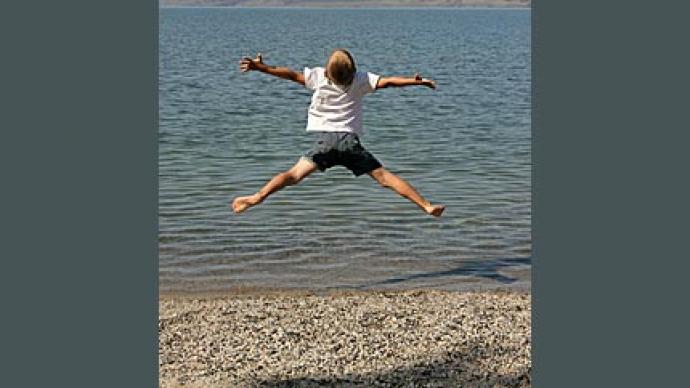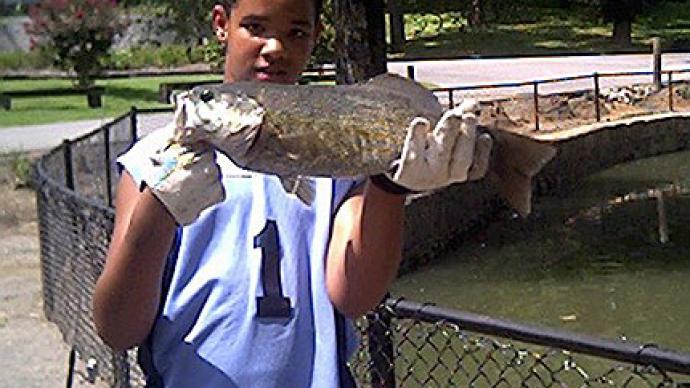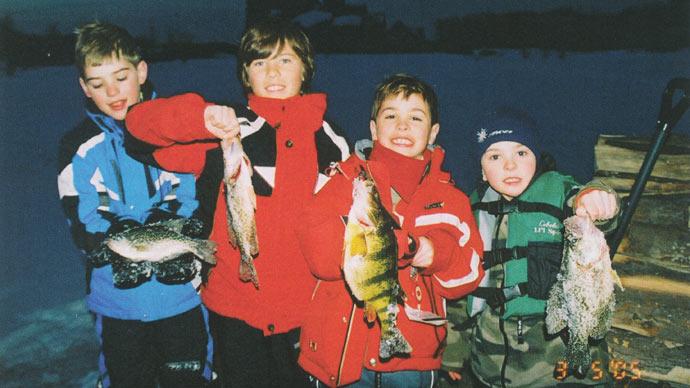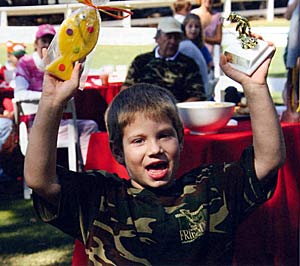
When you look in the mirror, you probably see a pondmeister who loves his pond. After all, you planted Vallisneria to absorb nitrogen run-off. You've cussed that last grass carp for uprooting it as fast as you could sprig it. You've walked the tight-rope of predator-prey relationships and seen your own reflection in the water's surface more than you see your spouse. Did you ever think your pond might be sick of you?
I won't go so far as to say you're hogging your pond, but there are lot of deserving people in your neck of the woods who would love the thrill of watching the far end of a fishing rod dip toward the water, doing business with one of your underwater prizes. You can make that happen, and Captain Fuzzy Davis, Director of Outdoor Pursuits at the Ford Plantation in Richmond Hill, Georgia, has just the angle to bridge the gap between your pond and very appreciative members of your community. Captain Fuzzy was an in-shore fishing guide at Hilton Head, South Carolina for twenty-three years. Sixteen years ago he and his wife, Kim, started a program called Fish With Friends, which provides children with a wide range of disabilities the opportunity to fish.
Organizations like the Ford Plantation can become disconnected with the surrounding community for several reasons. It could be because residents live there part time. Maybe they have had obligations and distractions which caused them to hunker down at home. Even private pond owners can get lost in a secluded paradise. Captain Fuzzy thinks events like Fish With Friends are the answer.
"It gets the community involved. It gets folks involved that might not get involved with special needs programs. And the kids absolutely love it," he says. The most recent event was held October 30, 2010, and the connection fostered between kids and fishing will make you want to fill it to the rim with bream. Okay, channel catfish and largemouth bass make kids very happy, too.
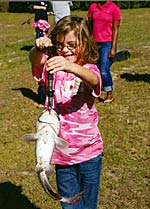
You can replicate Fish With Friends or use it as a guide to plan your own event benefiting children with disabilities. In either case there are key people you should get to know. First you must find motivated planners. Jeff and Lyla Scott are community organizers for Fish With Friends. While the two hours of fishing and celebration banquet afterward are not fund¬raisers, donations must be gathered. Jeff and Lyla reached out to their friends and neighbors- stressing that every bit helped. Volunteers for the event were also recruited. A rule of thumb is one volunteer per child in attendance. They serve as fishing buddies-baiting hooks, removing fish and so forth. One parent is also invited and serves as the caretaker for the child.
"It's all about them," Jeff says. "A lot of days it's not about them in their lives. Every kid gets a t-shirt. Every kid gets a hat, a trophy." Fishing rods, purchased for only ten dollars apiece, are given to the participants as gifts and Lyla says she handwrites thank you notes to everyone who donates. It's important if you want return contributors.
Make contacts in the school system. It's how you reach the children who would benefit most in your area. Frank Williams is the director of Special Education in Bryan County, Georgia. Williams worked with teachers, parents and even a behaviorist on staff to develop a set of criteria for who would be invited. Age and a student's amount of extracurricular activities were factors along with the base number the Scotts said they could accommodate. "We try to look very critically and personally," Williams says.
In previous years, the organizers and volunteers have been able to invite between thirty and forty children. For this reason, Williams helps root out the children who are not doing much socially outside the classroom. An invitation is sent with a deadline, followed by a registration form with another deadline. As deadlines are missed, more invitations are sent out to reach as many children as possible. There is a purpose to all the paperwork. "My experience has been that if you have to jump through a couple of hoops to get something- and you jump through those hoops-chances are you are going to follow through with that commitment," Williams says.
Forms include questions about special medications and food allergies. They also have an embedded legal waver and photo release so that pictures can be used to promote future events. The estimated costs of hosting such an event should include the $300-$500 cost of a one-day Special Event Policy purchased from an independent insurance agency. "The policy is usually in the name of whoever is hosting the event," Steven Templeton, an agent at Morris & Templeton Insurance in Savannah, Georgia, says. "If someone were to get injured at the event, that's what it is going to cover." The price of such a policy will vary with the number of children and the activities which are taking place.
Williams wants to assure those considering a fishing event like Fish With Friends. "In the five or six years I've actually been on site, we've never had a hook in a finger. We've never had a wet tennis shoe. We've never had anyone fall in," he says.
Gretchen Hemmings is a teacher at Richmond Hill Elementary. Her eight-year-old daughter, Emily, has classic autism and took part in the fishing event held in October along with her dad, Bobby, who is an employee at the local Bass Pro Shops. She agrees that the benefits outweigh any precautions that need be taken. "Emily has a hard time interacting with anybody," Gretchen explains. "I just don't want somebody at Domino's or Walmart talking to her." Kids are taught to be wary of strangers. "This allows her to interact with adults; it allows her to practice appropriate social behavior with someone she doesn't know."
Chatting with a volunteer who is steadying a fishing rod or smiling while a photo is taken are infrequent interactions for some children with disabilities. The high catch rate resulting from the supplementary feeding in the weeks preceding the big day was important. "It was good because Emily was catching fish," Bobby says. "And they would come along and take the fish off; everybody was nice," he recalls.
Kimberly Jones teaches sixth grade at Richmond Hill Middle and her eight-year-old daughter, Alonis, who has Downs syndrome, also participated with Fish With Friends. "I wish I would have known about it sooner. It was wonderful," Kimberly says. "We had such a good time." She couldn't get over the generosity shown by the event staff. "It's her pole? Are you serious?" Kimberly remembers chortling to a volunteer.
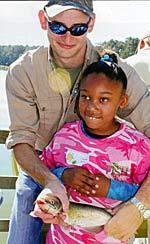
Identify fishing access points around your pond's perimeter. The bank should have a friendly descent for foot traffic. Depending on the area, wheelchairs might also be used. If that is too risky there, casting platforms or a dock are a must. The feeding done from these platforms and the fish shelter they provide make them excellent spots for impatient anglers.
"We stocked all our ponds with threadfin shad and they have an adherent egg. Any time there is anything to put an egg to stick to, you have a better reproductive cycle," Captain Fuzzy says. He recycles Christmas trees from the residents and submerges them to create an artificial reef system. Sinking them requires a five gallon bucket, concrete and some metal rebar. "Threadfin are really the key to growing big bass bigger," Fuzzy adds. They serve as a high protein food source and spawn a few times a year. An estimated two hundred cormorants and one hundred herons at the Ford Plantation appreciate them as well. The accomplished angler is also proud of his "reef-ka-bob" which is made by stacking pallets built from untreated wood on an aluminum pole.
Take advantage of fishing events to document fish nutrition, condition and population. Catfish, for example, are harvested several times a year, including by the anglers at Fish With Friends. This information is valuable. "We've been able to take out five hundred adult fish between 1 and 10 pounds and still have a great reproductive rate and healthy fish," Captain Fuzzy says. If examination of catches revealed big heads and skinny fish, lesions, or any other peculiarity, that would have been a call to action.
Short of peanut butter cups, most things are more fun when you share them. Your pond is no exception. No matter the scale of an event, why not reach out? Think of what you could offer the kids near you, but that's only half the picture. "The other half is what our kids do for the community," Frank Williams points out. He's not sure that people understand special needs kids will grow to be tax payers and wage earners, and that they have unique gifts to offer society. "They are people with disabilities, not disabled people," Williams says. "So any time our communities can be engaged in any type of event that embraces this population, the community benefits from that as much, if not more, than our kids do."
For advice on how to create a Fish With Friends event at your pond or have your child considered for an event like this, email the Ford Plantation's Fuzzy Davis at fdavis@fordplantation.com. You may also contact him by phone at 912-756-5886. You may also wish to contact the director of Special Education in your county for advice on how to get your pond some new visitors.
Reprinted with permission from Pond Boss Magazine

